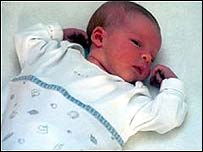The babies were screened at
around three to four weeks of age
All babies should have an ECG heart scan in their first month of life to check for life-threatening problems, say Italian cardiologists.
Routine ECG screening could save up to 250 lives a year in EU countries and would be cost-efficient, they claim in the European Heart Journal.
They based their calculations on work involving 45,000 infants.
Screening picked up a genetic condition called long QT syndrome which is treatable but can be deadly if missed.
Long QT syndrome
Long QT syndrome rarely causes symptoms but is a leading cause of sudden deaths in children and young adults, and when it occurs in infants their deaths are often mislabelled as sudden infant death syndrome (SIDS).
It is estimated to effect between one in 5,000 to one in 20,000 people.
It is a disorder of the electrical rhythm of the heart and because of this it can be seen clearly on an electrocardiogram or ECG - a trace recording of the electrical activity of the heart.
Professor Peter Schwartz, from the University of Pavia, and colleagues estimate that by screening, early deaths from long QT syndrome would be cut from 13.5% to 3.2% - saving 23 lives a year in Italy alone.
Early treatment of long QT syndrome would also prevent some deaths that are currently misclassified as SIDS.
In the study, ECG screening also picked up two other life-threatening heart conditions in infants, known collectively as congenital heart diseases, which had been missed by other routine medical checks.
Professor Schwartz said: "Our study clearly demonstrates that neonatal ECG screening is highly cost-effective and that a significant number of lives can be saved...for an objectively low cost."
Saving lives
His team estimates that the cost per year-of-life saved by identifying and treating long QT syndrome would be about 11,740 euros. For saving one entire life of 70 years it would be about 820,000 euros.
Professor Schwartz said: "The time is ripe for those involved in the administration of public health to consider the implementation by the National Health Services of such a programme."
However, a Department of Health spokesman said: "The UK National Screening Committee has looked specifically at screening children and young adults for abnormal heart conditions and has concluded there is not enough current evidence to support this.
"The NSC will keep this situation under review, taking new evidence into account - including the recent study from Italy."
Among the 45,000 babies in the Italian study, screening ECGs performed between 15 and 25 days detected potential long QT syndrome in almost one in 1,000. In more than 50% of these infants the researchers identified gene mutations known to be linked with long QT syndrome.
Steve Cox, deputy chief executive of Cardiac Risk in the Young (CRY) said: "This new study is a very encouraging step in our fight to prevent eight needless young deaths every week.
"It shows that neonatal screening is highly cost effective with a significant number of lives saved for an objectively low cost."
However, CRY believes screening should be carried out after puberty.
"Although neonatal screening is clearly important, CRY recommends ECG screening for all young people after puberty when the majority of cardiac conditions that can cause sudden cardiac death can be identified."
Source: BBC


No comments:
Post a Comment